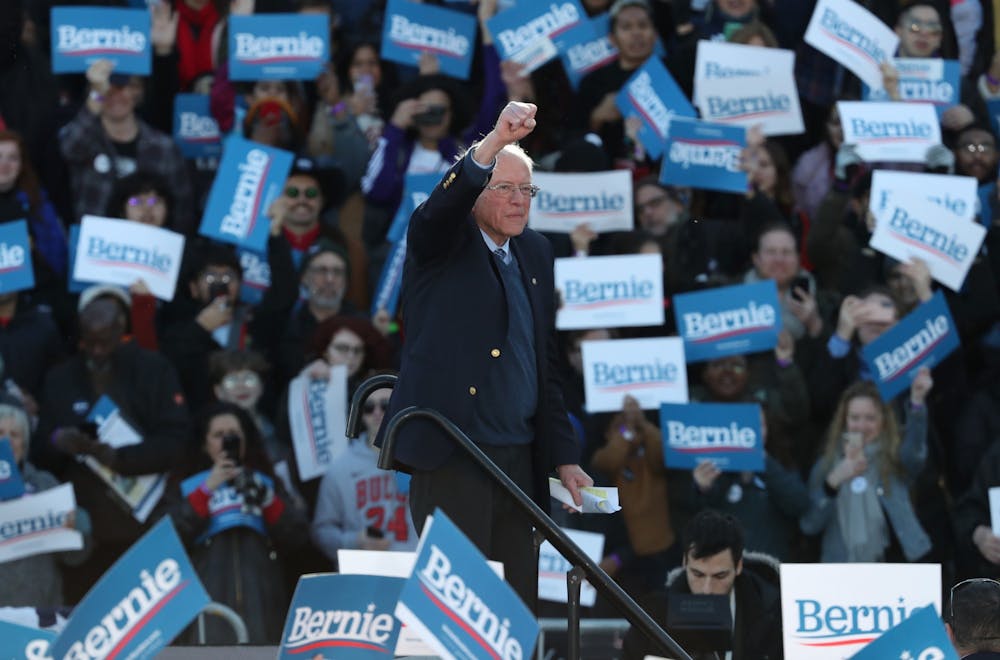After a tough Super Tuesday for Sen. Bernie Sanders, I-Vt., questions of his electability have ricocheted around social media and the Democratic Party. Some commentators doubt whether Sanders is a viable candidate.
Here on campus, I have often seen Students for Bernie at IU passionately tabling for their candidate. His enthusiastic supporters seem to be an energetic and reliable base, but will they be enough?
Despite the enthusiasm by his core group of backers, Sanders is not a widely popular candidate. He has struggled to win over a majority of the Democratic base and only won 50% of the vote in his home state of Vermont. In most states, Sanders struggled to get 30% of Democrats to vote for him.
David Broockman and Joshua Kalla, professors of political science at University of California, Berkeley, and Yale University, respectively, released a study last month on the turnout among demographics that Sanders would need to beat Trump in 2020. They found 11% of Democratic and independent voters younger than 35 would only turnout to vote in the general election if Sanders won the primary.
In this same study, 2% of independents and Democrats said they would vote in support of Trump if Sanders won the primary. Republican turnout would also likely increase.
Ultimately, Sanders’ lack of support from moderate voters would likely be greater than Biden’s lack of support from further-left voters. This effect is further increased by the fact that younger voters, the core of Sanders base, are less likely to vote than older counterparts.
Currently, millennials ages 18 to 35 comprise 27% of the voting eligible population, nearing the 31% of the voting eligible population that Baby Boomers make up, although only 46% of these millennials generally turnout to vote, compared to 69% of Baby Boomers.
The issue of socialism in particular is one that sees a large divide in the Democratic Party, especially when it comes to voter age. Among millennials and Gen Z, 49% view socialism positively according to a Gallup poll, while only 32% of Baby Boomers view socialism positively. This explains why Sanders is seeing so much support among young people and college students, but struggling to win over older and more traditional voters.
If Sanders is so popular among young people, why don’t young people in general come out to vote? Clearly this generation is engaged with political issues, as evident through social media. I believe that many young people don’t understand the importance of voting because they don’t see their votes as being as influential as other forms of activism.
For example, a viral Twitter post about Sanders or another candidate might be able to reach hundreds of thousands of people, all from the comfort of a couch. Voting, on the other hand, requires physically going to a polling place or registering for an absentee ballot, all for only one vote.
Even one of my professors said that one person’s vote really doesn’t matter that much, considering the vast numbers of votes cast and the winner-take-all system negating the opposite party’s votes in heavily Democratic or Republican states. While I reject that voting is a waste of time, there is no doubt that some see it this way.
The phenomenon leads to an appearance of young people being engaged and active politically without the results at the ballot box.
While Sanders’ message seems to resonate with younger voters, the vast majority of the electorate is still not convinced. If he continues to run to the far left, older moderate Democrats will almost certainly choose Biden, regardless of how popular he is among the youth. If Sanders wants a chance at the presidency, he needs more than retweets from millennials and Generation Z, something he probably can't get.
Brett Abbott (he/him) is a freshman studying finance and is the press secretary for College Republicans at IU. He plans to pursue a career in business or politics.






